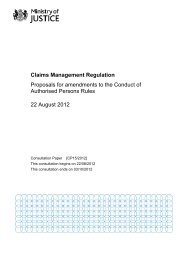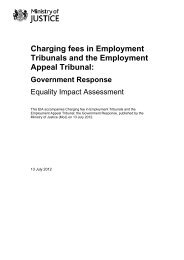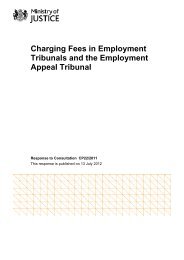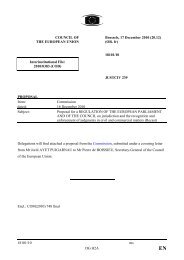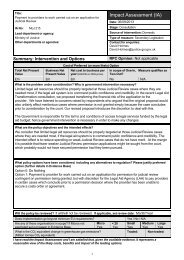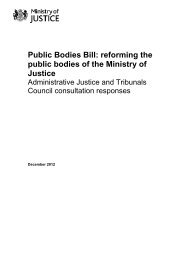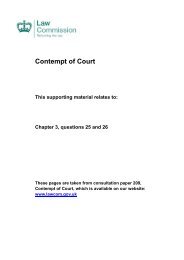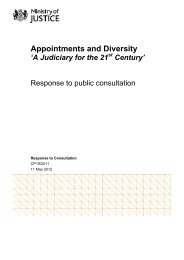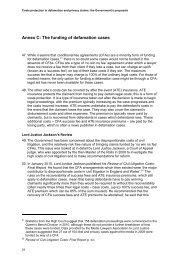Proposed reforms to attachment of earnings orders - Ministry of Justice
Proposed reforms to attachment of earnings orders - Ministry of Justice
Proposed reforms to attachment of earnings orders - Ministry of Justice
Create successful ePaper yourself
Turn your PDF publications into a flip-book with our unique Google optimized e-Paper software.
Annex 1: Post Implementation Review (PIR) Plan<br />
A PIR should be undertaken, usually three <strong>to</strong> five years after implementation <strong>of</strong> the policy, but<br />
exceptionally a longer period may be more appropriate. A PIR should examine the extent <strong>to</strong> which the<br />
implemented regulations have achieved their objectives, assess their costs and benefits and identify<br />
whether they are having any unintended consequences. Please set out the PIR Plan as detailed below.<br />
If there is no plan <strong>to</strong> do a PIR please provide reasons below.<br />
Basis <strong>of</strong> the review: [The basis <strong>of</strong> the review could be statu<strong>to</strong>ry (forming part <strong>of</strong> the legislation), it could be <strong>to</strong> review existing<br />
policy or there could be a political commitment <strong>to</strong> review];<br />
These proposals are subject <strong>to</strong> consultation and their implementation will depend on the results <strong>of</strong> the public<br />
response. Our delivery plan developing consulting on and implementing the secondary legislation and<br />
operational mechanisms, and at the same time as the operational mechanisms are being developed,<br />
putting in place any post implementation review arrangements.<br />
Review objective: [Is it intended as a proportionate check that regulation is operating as expected <strong>to</strong> tackle the problem <strong>of</strong><br />
concern; or as a wider exploration <strong>of</strong> the policy approach taken; or as a link from policy objective <strong>to</strong> outcome]<br />
The post implementation review will analyse the impact in terms <strong>of</strong> efficiency <strong>of</strong> process and user feedback.<br />
It will also check there was no negative impact on access <strong>to</strong> justice.<br />
Review approach and rationale: [e.g. describe here the review approach (in-depth evaluation, scope review <strong>of</strong> moni<strong>to</strong>ring<br />
data, scan <strong>of</strong> stakeholder views, etc.) and the rationale that made choosing such an approach]<br />
These proposals are at consultation stage. It is therefore not confirmed yet whether such <strong>reforms</strong> will be<br />
implemented. Subject <strong>to</strong> any revision at regulations consultation stage, evaluation will take place 3 year post<br />
consultation. We shall evaluate the effectiveness <strong>of</strong> the above intended benefits post implementation by a<br />
combination <strong>of</strong> methods. We shall use HMCS National Statistical information published in Judicial Statistics,<br />
supported by other operational statistical information. Working groups will also continue <strong>to</strong> form a key role in<br />
moni<strong>to</strong>ring the impact <strong>of</strong> the new court based enforcement changes. We may consider questionnaires, if<br />
they are appropriate <strong>to</strong> obtain qualitative or additional quantitative information which assists with the<br />
analysis <strong>of</strong> the impact <strong>of</strong> these proposals.<br />
Baseline: [The current (baseline) position against which the change introduced by the legislation can be measured]<br />
Option 0 – do nothing.<br />
Success criteria: [Criteria showing achievement <strong>of</strong> the policy objectives as set out in the final impact assessment; criteria for<br />
modifying or replacing the policy if it does not achieve its objectives]<br />
Improvement <strong>of</strong> cus<strong>to</strong>mers’ perception <strong>of</strong> services available <strong>to</strong> ensure effective enforcement<br />
Speedier court processing<br />
Improved debt recovery for credi<strong>to</strong>rs with reduced scope for deb<strong>to</strong>rs <strong>to</strong> avoid repayment.<br />
Moni<strong>to</strong>ring information arrangements: [Provide further details <strong>of</strong> the planned/existing arrangements in place that will<br />
allow a systematic collection systematic collection <strong>of</strong> moni<strong>to</strong>ring information for future policy review]<br />
Court user feedback will be moni<strong>to</strong>red through correspondence from the public and Parliamentary<br />
Questions. HMCS Civil & Family Operations also provide Civil Enforcement Policy with feedback from the<br />
queries they have received from court staff and users. Judicial statistics also provide indications <strong>of</strong> court<br />
user behaviour.<br />
Reasons for not planning a PIR: [If there is no plan <strong>to</strong> do a PIR please provide reasons here]<br />
18



